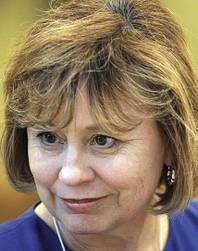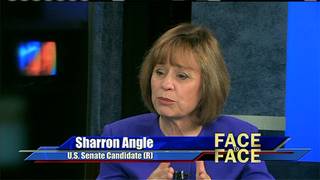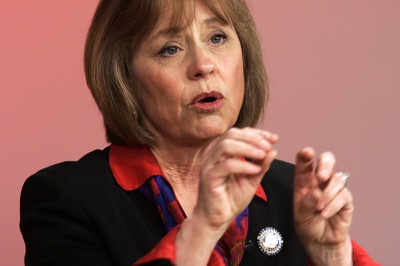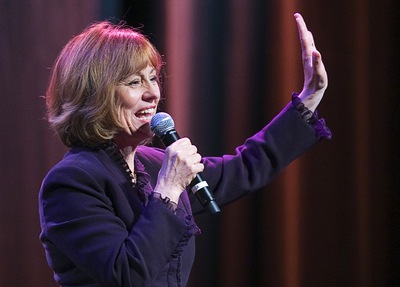
Andrew DeGraff / Special to the Sun
Sunday, July 18, 2010 | 2 a.m.

Sharron Angle
Sharron Angle Clears the Air

Viewing video requires the latest version of Adobe's Flash Player
Sun archives
- Sharron Angle: Campaign to defeat Harry Reid ‘a calling’ (7-14-2010)
- Numbers in Sharron Angle’s ad accurate, but final claim dubious (7-14-2010)
- Sharron Angle retreats a bit, but mostly stands ground (6-30-2010)
- Armed revolt part of Sharron Angle’s rhetoric (6-17-2010)
- Ad rings true of Sharron Angle on Social Security (6-16-2010)
- Senate candidate Sharron Angle left GOP in Reagan years (6-15-2010)
- Sharron Angle’s angle: Keep the spotlight on Harry Reid (6-10-2010)
- Sharron Angle wins; Harry Reid gets race he wanted (6-9-2010)
- Sharron Angle vows to ‘take back’ Harry Reid’s Senate seat (6-8-2010)
Republican U.S. Senate candidate Sharron Angle describes her motivation for seeking elected office as a religious calling.
Politics, including her bid to unseat Senate Majority Leader Harry Reid, is God’s purpose for her life — one he has long been preparing her for, she says.
“When God calls you, he also equips you and he doesn’t just say ‘Well, today you’re going to run against Harry Reid.’ There is a preparation,” she said during a recent interview on the Christian Broadcasting Network. “Moses had his preparatory time. Paul had his preparatory time. Even Jesus had his preparatory time, and so my preparation began on a school board.”
Although those remarks triggered surprise and even outrage last week, people familiar with Angle’s career in public life understood.
A Southern Baptist active in her church, Angle’s religious convictions have informed many of her positions throughout her years in politics. She believes abortion is a violation of God’s will and should be banned in all cases. She argued for the religious freedom of private and home schools. And she has said that public policy should support the “traditional” family structure as described in the Bible, in which one parent stays home with the children while the other works.
Indeed, although many Americans view the separation of church and state as one of the keys to the nation’s success as a multicultural society, Angle believes that religion has an expansive role to play in government. And, she has repeatedly said anyone who opposes that based on the claim of separation of church and state misunderstands the Constitution’s ban on “establishment of religion, or prohibiting the free exercise thereof.”
In this regard, Angle’s view of religion’s role in government parallels that of a religious political movement — Christian Reconstructionism — seeking to return American civil society to biblical law.
Reconstructionism, because of its more controversial aspects, is a label liberals would love to brand Angle with — a tactic they’ve attempted with other high-profile fundamentalist Christian politicians such as former Alaska Gov. Sarah Palin, former Arkansas Gov. Mike Huckabee and Rep. Ron Paul, R-Texas.
The movement’s more extreme beliefs are based on a strict interpretation of Mosaic law described in the Old Testament and include the execution of homosexuals and unchaste women and the denial of citizenship to those who don’t adhere to Reconstructionists’ religious beliefs. Angle has never advocated those views.
Reconstructionists’ primary mission, however, is to “reconstruct” the family, the church and the state according to biblical law.
To accomplish that, Reconstructionists interpret the separation of church and state doctrine as a constitutional wall protecting the church from the state. But unlike most interpretations of that doctrine, the Reconstructionists’ envisions a gaping one-way hole in the wall that allows Christian doctrine to infuse government. In other words, government must not interfere with Christians’ efforts to enact God’s law at home or at church and government itself should be run according to biblical law.
One leading Reconstructionist describes it as an “institutional separation,” according to Julie Ingersoll, a professor of religious studies at the University of North Florida. “Family, church and state — all are under biblical law” according to Reconstructionist belief, Ingersoll said.
It’s unclear how closely Angle’s view of the separation of church and state matches that description. Through spokesman Jerry Stacy, Angle refused to provide any insight into her religious beliefs when asked last week.
“The election in November is going to be about the economy,” Stacy said in a response to questions about Angle’s beliefs, before pivoting to an attack on Reid for “failed economy policies.”
But Angle addressed the issue during her legislative career and this campaign, claiming in interviews and legislative testimony that the separation of church and state is an unconstitutional doctrine.
“Thomas Jefferson was addressing a church and telling them a wall of separation had been put up precisely to protect the church from being taken over by a state religion,” Angle said last month in an interview on “Face to Face With Jon Ralston.” “That’s what they meant. They didn’t mean we couldn’t bring our values to the political forum.”
In legislative testimony on a school-choice bill in 1995, she said it was “un-American” to exclude private religious schools from government funding and that the separation of church and state is an “unconstitutional doctrine.”
But that is neither the mainstream view of the church-state doctrine nor the Founding Fathers’ intent, according to Richard Hughes, an expert on Christianity and religious history and senior fellow at the Ernest L. Boyer Center at Messiah College.
Although the founders intended to base the laws of the nation on God’s moral code, they never intended it to be an exclusively Christian view, Hughes said.
“A lot of people are religious who aren’t Christians,” Hughes said. “The founders clearly were religious, but they also clearly did not want to set up some kind of an official state church or say Christianity is the law of the land. That’s as clear to me as the nose on your face.”
Under Reconstructionist thought, government should have no role in education, safety net benefits such as Social Security or welfare, or in environmental protection. Angle has similarly advocated those positions.
Angle isn’t the only candidate with deep religious convictions. Reid, a practicing Mormon who doesn’t drink coffee or alcohol, holds some political views counter to those of his party because of his religion. For example, he describes himself as anti-abortion.
“I don’t think you can separate your religion from your politics; it’s part of your personality. It is part of who you are,” he told an interviewer at Brigham Young University in 2001.
Reid, however, rarely uses religious rhetoric in his public life.
The Reconstructionist movement was founded by an Orthodox Presbyterian minister, R.J. Rushdoony, in the 1970s.
Although Reconstructionism is mostly a religious movement that has taken root in scattered churches of multiple denominations, its most overt political action was the creation of the U.S. Taxpayers Party, now known as the Constitution Party. A leading Reconstructionist, Howard Phillips, who was mentored by Rushdoony, helped found the party.
In 1992, Angle helped resurrect the Constitution Party’s Nevada affiliate, the Independent American Party, of which she was a member until 1997.
The Independent American Party’s bylaws declare that Americans established “a government of law, under God, rooted in biblical law, which controlled and regulated government.”
Angle also is benefiting from a fundraising e-mail sent by Sen. Jim DeMint, R-S.C., to a mailing list maintained by prominent Reconstructionist Gary DeMar.
“This could be the most important message I send you this entire election cycle so I implore you to take a few minutes to read it,” DeMint’s e-mail began.
Janine Hansen, who with her brother helped found the Independent American Party, said she had never heard of Reconstructionists. Her political party’s belief in biblical law, she said, stems from its view that the Founding Fathers were “inspired by God” when they created the republic.
“Oh good heavens,” Hansen said when asked if the Independent American Party reflected any of Phillips’ Reconstructionist belief that civil society should be governed by biblical law. “I would say the Independent American Party has never been a part of that movement at all. Our belief in God goes back to our founders. It has nothing to do with that.”
Ingersoll, however, said Reconstructionist influences have seeped organically into much of the Christian right.
“The notion of biblical law comes out of Rushdoony and has been translated through the Constitution Party,” she said. “These folks could have soaked it in without knowing the words Christian Reconstructionism.”
Hansen noted the state party has had significant differences with the national party. Several years ago, the national party tried to oust the Nevada party because of its heavy Mormon membership. But Hansen said a devout belief in freedom of religion led the Nevada Independent American Party to fight for its membership in the national party.
Angle has voiced a similar conviction that members of different faiths be given the freedom to practice their religion, which is a significant departure from Rushdoony’s Reconstuctionist philosophy.
“To tie Sharron to something the national party did, or has done, is absurd to me,” Hansen said.
CORRECTION: This story originally referred to Massey College, but it has been changed to Messiah College. | (July 18, 2010)



Join the Discussion:
Check this out for a full explanation of our conversion to the LiveFyre commenting system and instructions on how to sign up for an account.
Full comments policy